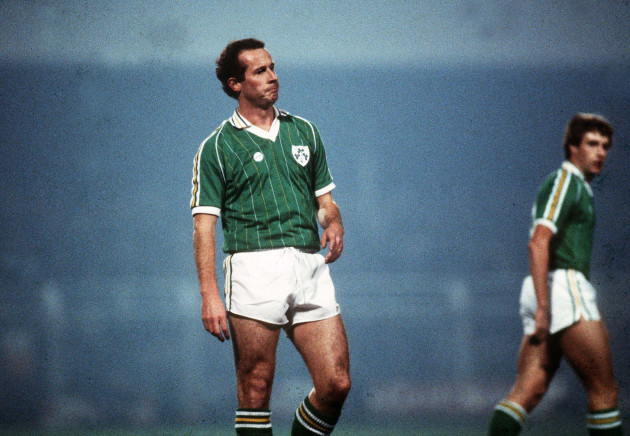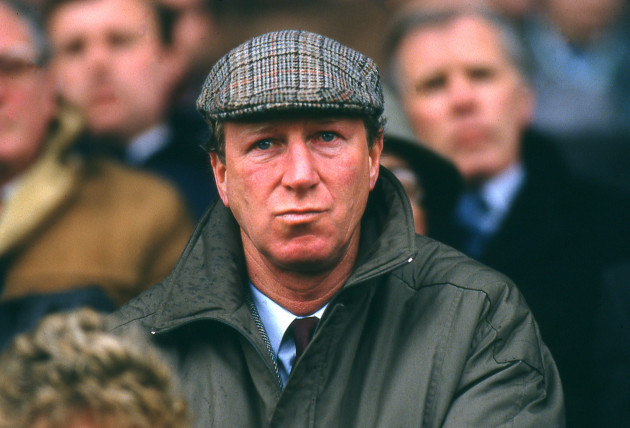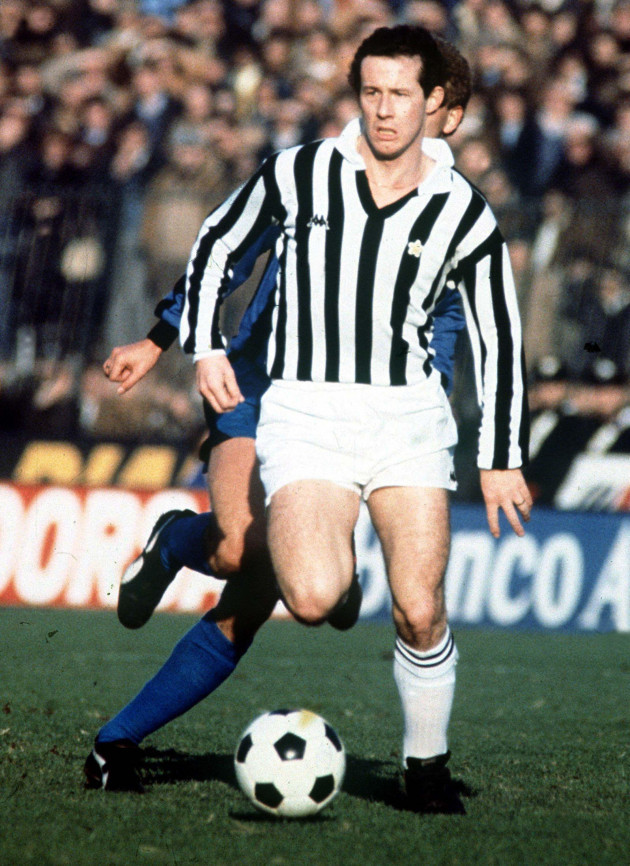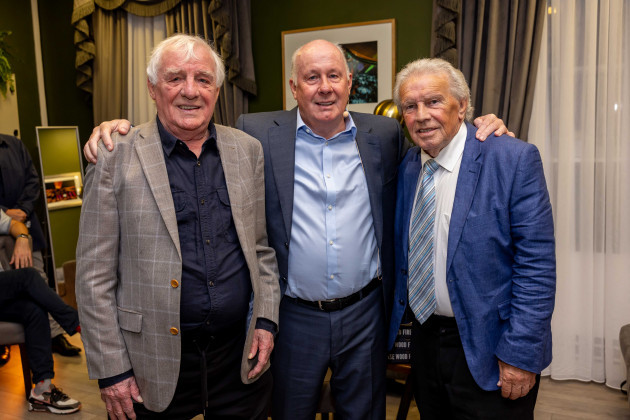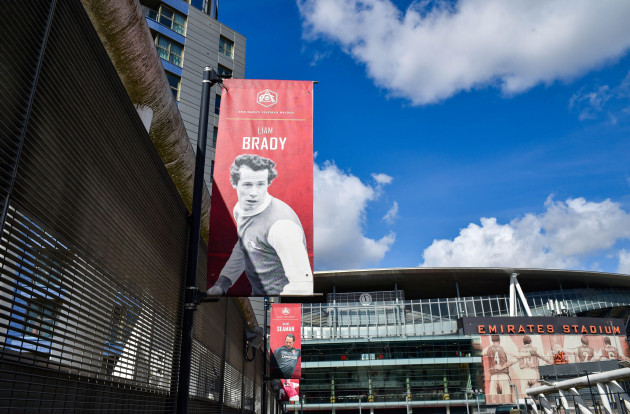IS LIAM BRADY the best Republic of Ireland international never to play at a major tournament?
You could also make a case for his great friend and the man who gave him his debut, John Giles.
People old enough to remember might also consider players such as Johnny Carey, Charlie Hurley and Shay Brennan in the argument.
But for those who saw him play, Brady was as good as anyone to wear the green jersey and the fact that he never graced a World Cup or European Championships is a great misfortune.
Yet it is still unlikely he would swap his career for anyone else’s.
His list of achievements includes an FA Cup winners’ medal, two Serie A titles, the 1978-79 PFA Players’ Player of the Year and three appearances in the PFA Team of the Year.
Yet as is often the case with the highest achievers, Brady still feels he could have been better.
“When I look back from this distance, there’s a little bit of regret that I didn’t push myself harder,” he writes in his new book Born to be a Footballer.
“With more dedication, I could have been a lot better with my right foot and a lot stronger physically.
“It was complacency, to some extent. I knew I had more ability than my teammates in the youths.”
‘Born to be a Footballer’ is Brady’s second book. The first, ‘So Far So Good,’ was published when he was just 24 and starting to establish himself as a top player.
“It put me off [writing a book] for the best part of 50 years,” Brady tells The 42. “It was a mistake to do that, and I was pretty naive. I was just starting out in the game. And, I don’t think I had any right to write a book.
“But I felt after so many years involved in football, I was entitled to tell a story [now]. ‘Entitled’ is probably the wrong word but I felt like telling it.
“And then lockdown was going on. And everybody was getting a bit reflective, thinking what they could do, as well, trying to keep themselves occupied. And that’s when I got stuck into it.”
Gifted creative players were sometimes perceived as somewhat sensitive and soft in the 1970s and ’80s. Brady, however, was not someone who could be easily bullied. One of the earliest and most infamous episodes in his career attests to his strong-mindedness.
Brady came from a family that was steeped in GAA, but soccer was always the Dubliner’s primary love. He would often play for Whitehall Gaels growing up when the matches didn’t clash with those of St Kevin’s Boys.
The multi-talented athlete also played left-half forward for his school, St Aidan’s CBS, and enjoyed great success in both sports early on.
Yet there was only ever going to be one choice in the long term and conflict arose when Brady turned down the opportunity to line out in a GAA challenge match and instead accepted the chance to captain Ireland U15s against Wales on the same day.
At the time, the GAA rulebook forbade its members from playing or watching other sports, yet Brady wrongly assumed there would be no major issue.
Instead, the principal, Brother Loughran, told him he would not be welcome back at the school if he missed the GAA match.
Brady played for Ireland anyway and was subsequently expelled from the school despite pleas from his father.
Even in that era, it was a controversial matter — Brady’s dad contacted a journalist and the story made the newspapers.
He ended up studying for his Inter Cert exams in nearby Plunkett Technical School and was ultimately allowed to sit them in St Aidan’s, despite not attending a class there since the drama.
“The GAA didn’t allow their players to play what they called foreign sports. But really what they meant was English sports,” says Brady.
“It happened to a lot of the lads, not only in Dublin but across the country.
“They didn’t want you playing soccer, the GAA. It was kind of an anti-British political rule. Trying to stop kids enjoying themselves is ridiculous, isn’t it?
“But that’s what it was. And I suppose the brothers I was dealing with at school at the time were indoctrinated in this kind of outlook. They were more or less saying that playing soccer for Ireland doesn’t really mean anything.
“If I was in school in England, and I was picked to captain the English schoolboy soccer team, I’d be paraded in front of the whole school and applauded and so forth. But I was told not to come back.”
The fraught Anglo-Irish relations were also palpable when Brady went across the water to live in London after signing with Arsenal.
Brady was just 16 when he joined the Gunners in 1971. His coming of age there happened to coincide with the height of The Troubles.
As an Irishman living in Britain, did he ever feel unwelcome or in danger?
“Well, I think you’re aware of it. The London people were great people. They were extremely good to me, but they didn’t understand what was going on in Northern Ireland. They didn’t understand why, or the reasons behind it and things like that.
“There was Bloody Sunday when I was there in 1972, where a lot of innocent people were taken out by the British Army. I was living in England at the time and reading the papers, and even speaking to people, they thought the British Army hadn’t done anything wrong.
“They just didn’t get it. So you kind of kept your head down with people you didn’t know if I can put it that way to you.”
*****
Brady’s career with Ireland can perhaps best be described as bittersweet, though he writes that “in the main, I loved it”.
However, he also adds: “At other times, it was bitterly frustrating. At the end, it brought heartbreak. Often it made me deeply cynical about the powers that control football and refereeing and whatever dark forces were haunting us.”
One of the highlights was his debut when an 18-year-old Brady produced an accomplished display amid a famous 3-0 win over the Soviet Union in a European qualifier at Dalymount Park.
Brady credits then-manager John Giles with introducing “hope and belief” to Irish football. Previously, the national team had toiled under the inept decision-making of a widely unpopular selection committee.
Yet this new era prompted greater expectations and bigger disappointment when results went awry. And Brady, as the star player, sometimes bore the brunt of the criticism.
It was akin to the current Stephen Kenny regime in the sense that Ireland were trying to play progressive football that was attractive to watch, though results didn’t quite go their way, often owing to a mixture of sheer misfortune and dubious refereeing — the most obvious example of the latter took place in the Eoin Hand era when several baffling decisions by Portuguese official Raul Nazare ultimately denied Ireland the point that would have secured their qualification for the 1982 World Cup.
“Eoin took over from John and tried to carry things on,” Brady recalls. “John had kind of instilled the way we wanted to play, all those things, and Eoin quite rightly just said: ‘Well, we’ll carry on doing that. He didn’t try and change the style of play or anything like that.
“And we were technical, we were trying to pass out from the back and beat teams with skill and ability.
“But they were both very unlucky. We were just talking last night, John and me, about how many times we were robbed, and Eoin the same. At least four games could have changed the fact that we never qualified until Jack came along.
“We could have qualified earlier had we had decent referees, and that’s why I’m all for VAR now.”
It was France who pipped Ireland to qualification on goal difference for the 1982 tournament. A similarly acrimonious scenario would occur 27 years later, and again, it was the French who were the beneficiaries. An obvious Thierry Henry handball was missed by the referee in the lead-up to the goal that saw Les Bleus seal their qualification for the 2010 World Cup, knocking out Ireland in the process. On this occasion, Brady was watching on from the sidelines as a coach for the Irish team during Giovanni Trapattoni’s time in charge.
*****
Towards the latter part of his career, Brady again came agonisingly close to playing at a major tournament.
His career under Jack Charlton got off to an unpromising start.
In the weeks after being appointed Ireland manager, Charlton attended a wedding in which he allegedly told former Leeds teammate Billy Bremner of his plans to “bomb out Brady” from the Irish team.
The comments were relayed back to Brady, who says he is unsure why the English manager had such a negative preconception of him, but believes it could be to do with his particular friendliness with some prominent journalists.
“Jack was very close to the journalistic world. He always had friends in the press. We could see that when we gathered for qualifying games. There were always press in the hotel bar. He was mixing with them, rather than anyone else.
“I’m only assuming this now, but my guess is people were telling him when he got the job: ‘Brady’s got too much influence, Brady’s this, Brady’s that.’
“And he had this way he wanted the team to play. He knew that I would have trouble going down that road. So I think all those things put it in his mind that he wasn’t going to put up with me for long.”
Brady suggests in the book that Eamon Dunphy may have been one of the journalists apparently in Charlton’s ear but downplays this notion now.
“Eamon’s read the book and he said that wasn’t the case. I said: ‘Eamon, I didn’t say it was 100% you. My suspicion was that you were one of the people who were telling him [the negative comments].’ And he said: ‘No.’ So I’m guessing if it wasn’t Eamon, it was other members of the press.
“I was never one to be friendly with the press. I was always kind of standoffish. I think, for example, if they wanted to do an interview, I wouldn’t do it and things like that. So there was a bit of friction there, you know?”
Despite the clear tension that existed between the pair, Brady and Charlton initially worked well together.
Brady was playing in Italy at the time, and he had reservations about Charlton’s direct style — a stark contrast with the patient, technical football he was accustomed to in Serie A.
Nonetheless, Brady acceded to the World Cup winner’s plan and featured in all eight games as Ireland made history to qualify for Euro ’88. Brady also scored what he describes as his favourite international goal around this period — a classy winner in a 1-0 victory over Brazil during a 1987 friendly at Lansdowne Road.
Yet the midfielder was once again denied an appearance at a major tournament. He was sent off in Ireland’s final qualifier near the end of a 2-0 win, an incident he describes as “one of the stupidest moments of my career,” finally reacting to relentless provocation by Bulgarian players throughout the game.
Brady consequently looked set to miss out on the Euros after being handed a four-match ban, but after an appeal, the suspension was halved to two games. Charlton subsequently confirmed he would be bringing Brady to the Euros, only for a knee injury to later scupper his hopes of participation.
Moreover, when Italia ’90 came around, Brady was still only 34 and playing back in England with West Ham, but by that stage, Charlton had decided he was no longer at the level required for international football.
It led to one of the more controversial moments of the Englishman’s reign when he substituted Brady just 35 minutes into a friendly with West Germany.
Charlton later suggested the move was premeditated and that he wanted to show fans the legendary figure was past his best, caustically remarking that Irish people “don’t give up on their f****** heroes easily”.
An angry Brady confronted the Irish boss at half-time, leading to “a shouting match,” and the Dubliner told reporters after the game that he was retiring from international football.
It was a sad conclusion to a career with Ireland that had begun so gloriously, 16 years before.
Yet the animosity between these two legends of Irish football did not last. Brady received a letter from Charlton a few weeks after the incident. Part of it read: “I never intended to hurt you, believe that. You would be very welcome to come to Italy should we get there. In your testimonial, I will do all I can to help.”
“We became close again,” says Brady. “We were close once I started playing for him. And he realised I could not only play for him in the way he wanted to play, but I was also going to be very useful for him.
“And once he realised that we got on great, we got along fine. You could laugh with Jack. He was a very enjoyable personality, in many ways.
“We fell out when he substituted me [in the first half against West Germany] — I didn’t think that that was right.
“And then, I got that letter, and I rang him up and said: ‘Look, Jack, everything’s fine. I wish you well. I want you to qualify.’
“When I went to Italia ’90 with the BBC [as a pundit], I was very welcome around the hotel and things like that. And he helped a great deal with my testimonial in 1990 before they went off to the World Cup.”
And did Brady ever feel cursed, given how close he so often came to playing at a major tournament while continually falling just short for various reasons?
“I always kept believing but after ’88, I knew probably my time had gone. I think if I had another manager, a John Giles, they would have maybe kept me around for the 1990 World Cup. I would have been 34 then but John played until he was 38.
“But in Jack’s eyes, I was unable to do what he wanted me to do. And that was me out. So yeah, bad luck, bad referees, it wasn’t meant to be.”
*****
Brady’s post-playing career similarly had no shortage of ups and downs.
Just over a year after his last game with West Ham, the Ireland legend was appointed as Celtic boss.
He spent two years at the Scottish side and a further two years as manager of Brighton, but each reign ended in disappointment, with financial issues hampering both clubs.
“I think you have to be a certain type of person to be a successful manager,” he says. “But then again if your circumstances are suitable then that can make all the difference. At Celtic at the time, they were second best to Rangers financially big time. Rangers were bringing in a lot of star players from England and other parts of the world.
“We didn’t have the money to match that. So it was a tough task — even the guys who followed me at Celtic didn’t do it.
“I was asked if I had done it the other way around and started at a smaller club and worked my way up, [whether] management might have been different for me. But I was in at the deep end, and I didn’t have the experience to handle it.”
In July 1996, Brady found perhaps his true post-playing-career calling when he undertook the role of Head of Youth Development and Academy Director at Arsenal.
His time there coincided with much of Arsene Wenger’s illustrious period in charge of the Gunners.
“It was just so different to anything I’ve ever seen,” he says of the Frenchman’s approach.
“I was only used to my managers [as a player]. He went into such detail about football and how football should be played, how footballers should prepare, and how they should look after themselves. He really was ahead of his time.”
For 18 years, Brady helped oversee the progress of countless young footballers — he cites Ashley Cole and Jack Wilshere as the two best English players the academy produced during his tenure.
Are there any common traits in the players who make it in football compared to the vast majority that don’t?
“Ability and dedication,” he replies. “You have to have both of them. And the ones who had that went all the way. The ones who didn’t hit the heights probably lacked a bit of ability, probably lacked a bit of dedication.
“Some players you thought were absolute certainties because of their ability didn’t get there in the end, because they weren’t professional enough.”
Notwithstanding his prowess as a player and coach, these days Brady is best known in Ireland as a longstanding pundit for RTÉ Sport.
Last June, Brady announced that he was leaving this job after 25 years of analysing games.
But the background behind how the footballing great became such a familiar fixture on Irish TV screens is a fascinating one.
For a long time, along with Bill O’Herlihy, John Giles and Eamon Dunphy, he was a mainstay of the RTÉ panel.
Yet Brady was reluctant to take up the offer to join the panel in 1998. While he was great friends with Giles, there was serious tension between him and Dunphy.
Dunphy, in his role as a pundit and sportswriter, had on many occasions been highly critical of Brady during the latter’s playing career.
The Arsenal legend at first felt he could not work with the journalist who once described him as “a rich young man no longer capable of meeting the challenge of top-class football”.
In the end, Giles convinced Brady to give it a go, and against the odds, he eventually became quite close to Dunphy and continues to be part of his podcast ‘The Stand’ to this day.
“I never envisaged [us] ever being in the same room, to be honest — such are the twists of life. I didn’t want to have anything to do with Eamon, let’s say in the late ’80s and ’90s.
“Then RTÉ made me an offer. They wanted me to join him and John on the panel. I was not very keen. Because in my mind, there was still bad blood.
“I rang John and John said: ‘Look, at least try and see how you get on. If you don’t like it, you can always walk away.
“He said: ‘You’ll never be bored in his company.’ And John, as so often [is the case], was absolutely right.
“In the end, I just forgot about what had gone on in the past and we became firm friends.”
Not that Dunphy and Brady always shared the same opinion — there were plenty of fierce debates between the pair. What does Brady think was the biggest argument they had over many years working together?
“About Roy Keane, I think,” he responds. “Who was in the right, Roy Keane or Mick McCarthy [during the pre-2002 World Cup Saipan debacle]?
“Eamon was so in Roy Keane’s corner — he couldn’t see how anyone could have a different point of view.
“I’ve always thought I was right, still to this day. I think it divided the country and it’s still divided when they look back.
“It’s just a great shame that we didn’t have him there [at the 2002 World Cup]. He was such a great player. If we had him there, we might have even surpassed our quarter-final place in 1990.”
That tournament seems so far away now, with the Irish team struggling under Stephen Kenny, while they have not reached a major tournament since 2016.
It is also a long time since Irish football has seen a player of Keane or Brady’s calibre. The latter in one of his final punditry appearances described how Kenny is working with “the worst group of players that any manager has had in my lifetime”. He later elaborated that the headline-making quote was not intended to be disrespectful and was meant to highlight a lack of talent in the set-up rather than casting aspersions on the players’ professionalism.
In the same Irish Examiner interview, Brady said he would be “very happy to help out the FAI in any way if they ever needed it”.
The 67-year-old has given so much to football in Ireland and elsewhere across many decades, so his opinion is certainly worth considering.
Having worked at Arsenal for such a lengthy period, he knows exactly what is needed to produce top-class young players and it is in this area where he believes Ireland are falling short currently.
“The system of developing kids is not good enough here led by the FAI,” he says.
“It needs a total rethink, restructuring, obviously needs money to be put into it to improve our facilities for young players and coaching for young players.
“We’ve got to come up with a system akin to what the rugby lads are doing in many ways.
“We just should find out what they are doing and maybe copy it with the right kind of people. But that takes money and I don’t know where the money’s going to come from.
“I have a feeling it would need to come from an individual benefactor. Someone who has lots of money, who cares about Irish football and is prepared to create an academy system that they have in England for the best young Irish players. I could see that making a massive improvement in things if it was to happen.”
‘Born to be a Footballer’ by Liam Brady is published by Eriu. More info here.


